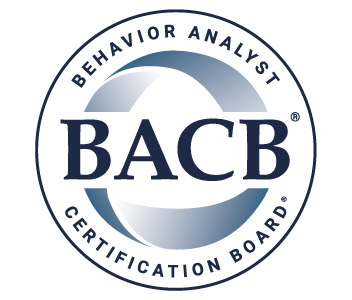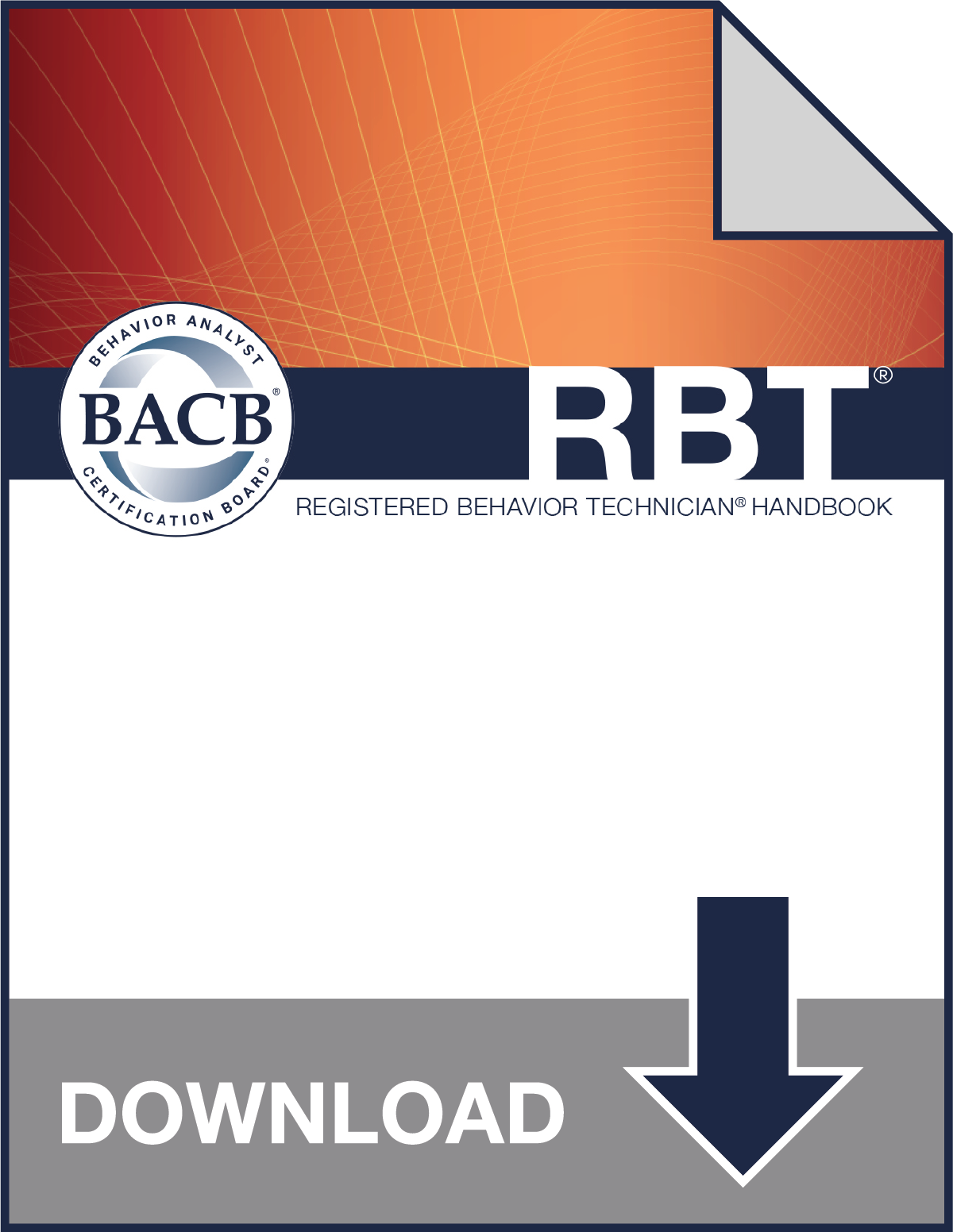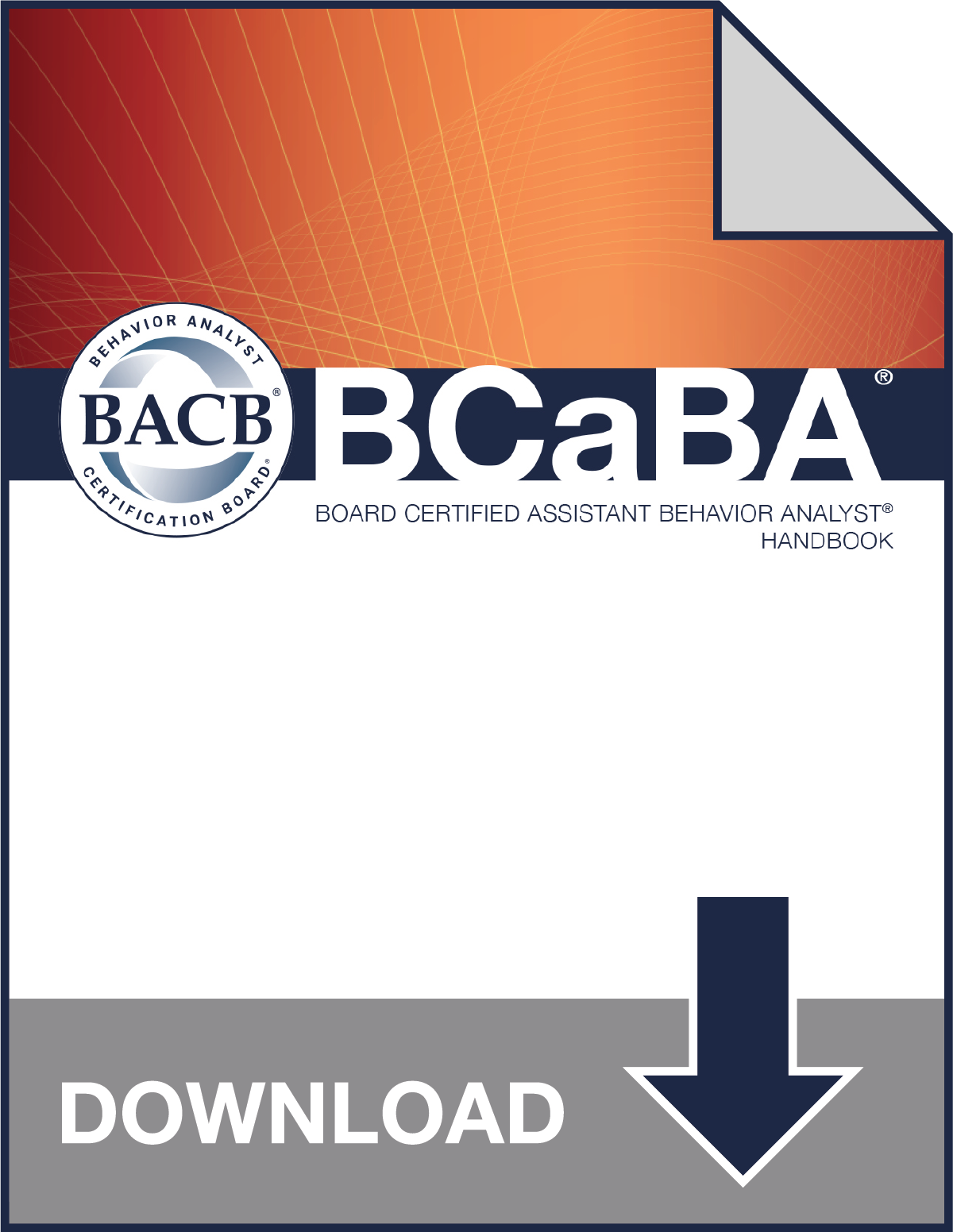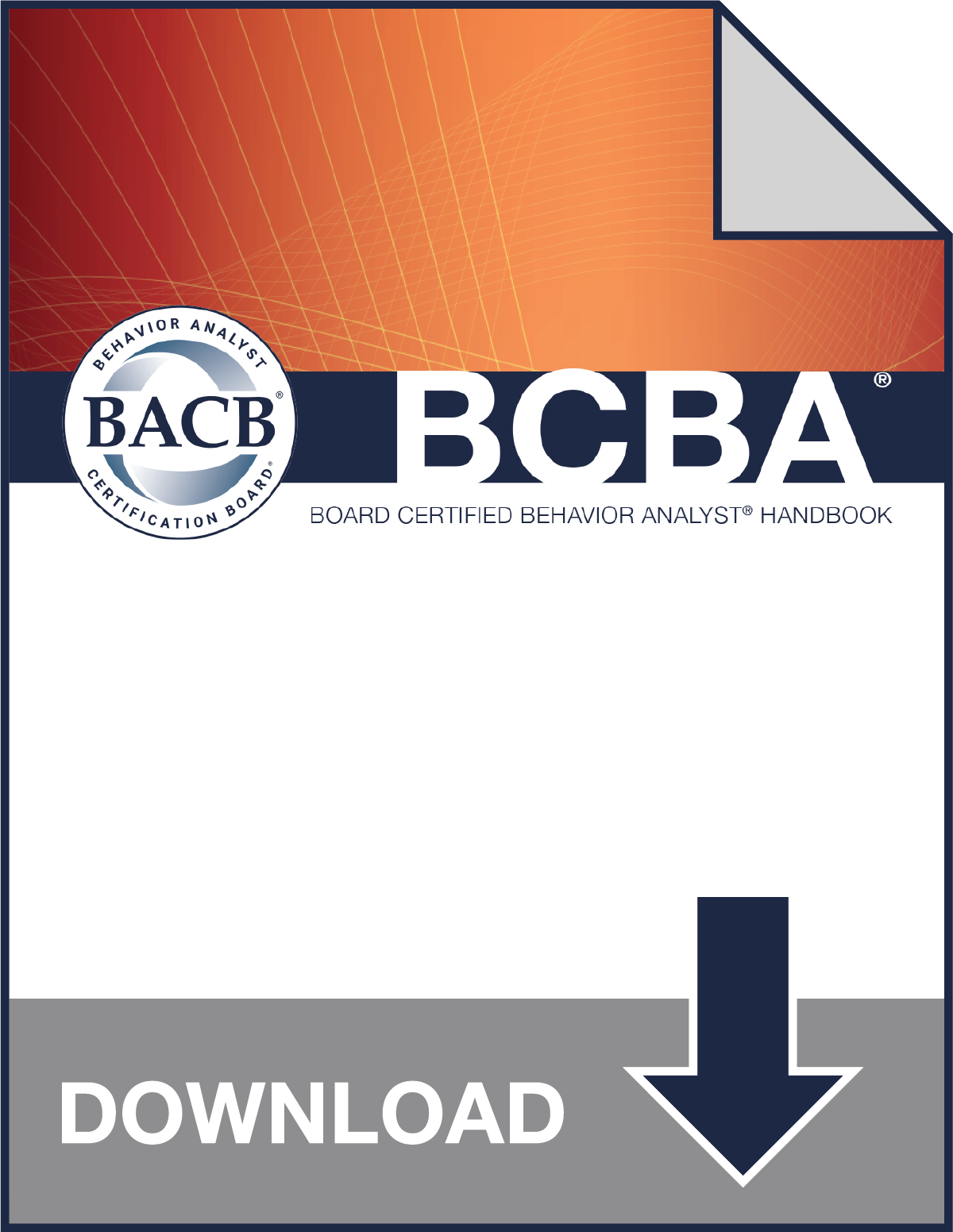Once you meet all applicable eligibility requirements, submit a certification application, and receive an approved determination, you must take and pass a BACB certification examination. You will schedule and pay for this examination through your Pearson VUE account.
BACB examinations are composed of multiple-choice questions. Each question has 4 possible answers and only 1 correct answer. Candidates have a specified amount of time to complete the examination. The details of each examination are as follows:
| Examination Element | BCBA | BCaBA | RBT |
|---|---|---|---|
| Examination Length | 4 hours | 4 hours | 90 minutes |
| Examination Questions | 185 | 175 | 85 |
| Examination Delivery | In-person | ||
The BACB contracts with Pearson VUE to deliver BACB examinations in person at authorized Pearson VUE testing sites and US military bases that meet the security requirements necessary for the administration of high-stakes examinations. The BACB authorizes the use of testing sites in the US, Canada, Australia, and the UK and evaluates the addition of new sites routinely and by requests made through Pearson VUE’s website.
Examinations are administered by Pearson VUE using a computer-based testing (CBT) delivery format. Pearson VUE’s BACB Certification Testing web page offers:
- a tutorial to become familiar with the CBT format
- information about what to expect at a Pearson VUE testing center
- examination locations and testing centers
For more details on what to expect on examination day, please refer to the Examination section of the BCBA, BCaBA, or RBT Handbook.
RBT Examinations
Please refer to the Examination section of the RBT Handbook for comprehensive information about our certification examination, including preparation for the examination, policies and rules, and what to expect after passing the examination.
Rescheduling Policy:
If you must reschedule your appointment with Pearson VUE, you must do so a minimum of 48 hours prior to the scheduled examination date. To reschedule your examination, please contact Pearson VUE by visiting Pearson VUE’s BACB examination webpage and signing into your account, or contacting Pearson VUE’s customer service directly.
Cancellation Policy:
If you must cancel your appointment with Pearson VUE, you must do so a minimum of 48 hours prior to the scheduled examination date. To cancel your exam please contact Pearson VUE by visiting Pearson VUE’s BACB examination webpage and signing into your account, or contacting Pearson VUE’s customer service directly
Pearson VUE Customer Servicer
The contact informations and hours of operation for Pearson VUE can be found on the Contact Us web page of Pearson VUE’s BACB examination webpage. For questions about BACB examinations in general, please use the Contact Us form.
Associated Fees
| Timeline | Fees |
|---|---|
| 30 to 5 days before the examination appointment | $27 |
| 5 days to 48 hours before the examination appointment | $32 |
You will be notified of your results at the testing site as soon as you complete the examination. The BACB will confirm your results via email, and they will appear in your BACB account within approximately one week of completing the examination.
| Testing and Passing Measures | 2020** | 2021*** | 2022 | 2023 | 2024 | |
|---|---|---|---|---|---|---|
| Number of Candidates Tested | First Time | 28,794 | 43,452 | 58,322 | 73,690 | 90,741 |
| Retakes | 6,634 | 10,793 | 20,362 | 30,573 | 46,988 | |
| Percentage of Candidates Passing | First Time | 84% | 83% | 77% | 74% | 73% |
| Retakes | 52% | 53% | 44% | 41% | 36% | |
BCaBA Examinations
Please refer to the Examination section of the BCaBA Handbook for comprehensive information about our certification examination, including preparation for the examination, policies and rules, and what to expect after passing the examination.
Any appointment canceled or rescheduled within 30 days of the examination date will be subject to a fee. Appointments canceled or rescheduled 30 or more days prior to an examination appointment will not incur a fee.
| Timeline | Fees |
|---|---|
| 30 to 5 days before the examination appointment | $59 |
| 5 days to 48 hours before the examination appointment | $69 |
You will be notified of your results at the testing site as soon as you complete the examination. The BACB will confirm your results via email, and they will appear in your BACB account within approximately one week of completing the examination.
| Testing and Passing Measures | 2020 | 2021 | 2022 | 2023 | 2024 | |
|---|---|---|---|---|---|---|
| Number of Candidates Tested | First Time | 1,042 | 2,130 | 1,190 | 931 | 1,011 |
| Retakes | 667 | 1,275 | 949 | 855 | 1,040 | |
| Percentage of Candidates Passing | First Time | 66% | 61% | 49% | 56% | 54% |
| Retakes | 41% | 32% | 25% | 25% | 22% | |
BCBA Examinations
Please refer to the Examination section of the BCBA Handbook for comprehensive information about our certification examination, including preparation for the examination, policies and rules, and what to expect after passing the examination.
Any appointment canceled or rescheduled within 30 days of the examination date will be subject to a fee. Appointments canceled or rescheduled 30 or more days prior to an examination appointment will not incur a fee.
| Timeline | Fees |
|---|---|
| 30 to 5 days before the examination appointment | $59 |
| 5 days to 48 hours before the examination appointment | $69 |
You will be notified of your results at the testing site as soon as you complete the examination. The BACB will confirm your results via email, and they will appear in your BACB account within approximately one week of completing the examination.
| Testing and Passing Measures | 2020 | 2021 | 2022 | 2023 | 2024 | |
|---|---|---|---|---|---|---|
| Number of Candidates Tested | First Time | 6,583 | 12,107 | 7,179 | 8,255 | 9,911 |
| Retakes | 6,166 | 11,301 | 8,575 | 10,450 | 11,780 | |
| Percentage of Candidates Passing | First Time | 66% | 60% | 55% | 56% | 54% |
| Retakes | 31% | 28% | 24% | 23% | 25% | |
Examination Scoring
Method to Examination Scores
The BACB uses the modified Angoff method for establishing the passing score for each base examination form. New base examination forms are created approximately every five years or whenever there is a significant change to the examination content, such as the introduction of a new task list. The BACB maintains a large pool of questions that can be used to generate many different forms of the examination that are equated to the base examination.
The modified Angoff method is criterion referenced, meaning that the passing score for each base examination is established by a panel of BACB-certified subject matter experts and then approved by the BACB Board of Directors. Your performance on the examination is not dependent on the performance of those taking the examination with you.
The BACB is committed to reporting uncompromised and valid examination scores. On rare occasions, circumstances may invalidate examination scores. The BACB reserves the right to cancel or withhold examination scores due to suspected or documented misconduct during testing at a Pearson VUE site or violation of the BACB Professional and Ethical Compliance Code for Behavior Analysts. Invalidation may also occur due to situations beyond your control—or that of the BACB’s—at the testing site. Should this occur, you are encouraged to submit an administrative appeal.
FAQs About Scoring
The BACB maintains a large pool of questions that can be used to generate many different forms of each examination. For security reasons, the examination forms are updated on a regular basis. Furthermore, multiple forms of the examinations are in use during each testing period, and candidates are randomly assigned to these forms.
The BACB uses statistical data on how each question performs to evaluate the difficulty of each examination form. The examinations are carefully constructed in order to minimize variations in difficulty from one form to another. However, it is possible to have slight variations in difficulty based on the particular combination of questions that are selected for each examination form. This is taken into account when the passing scores are set, so it does not matter which examination form each candidate takes.
Every BACB examination undergoes psychometric statistical equating to assure that scores on different forms are adjusted for any difference in the levels of difficulty. Therefore, the actual number of correct answers required to pass each examination may vary depending on the form and level of difficulty of that examination. Thus, because the passing score may vary from one examination to another, the raw number of questions answered correctly is not reported.
Passing candidates only receive notice that they have passed the examination; no additional report is provided. Failing candidates are provided with reports regarding their performance. For the BCBA and BCaBA examinations, the report includes the percentage of questions answered correctly and total number of questions within each of the primary examination content areas. For RBT examinations, the report provides a list of the RBT tasks for which the candidate answered items incorrectly. This information is provided solely for the purpose of guiding future study efforts.
Please see the Examination Scoring section, which describes the method used for setting passing scores.
Scaled scores are created when the number of questions that candidates answer correctly are mathematically transformed so that the passing score equals a certain point on a scale starting at 0 and ending at a number that equals the highest possible score. This is similar to converting inches to centimeters. For example, a 10-inch ribbon will be 25.4 centimeters long. The length of the ribbon has not changed—only the units of measurement that were used to describe it.
The use of scaled scores allows us to directly compare scores from one examination form to another because the passing standard will always be the same. In the long run, this process will make the scoring of the examination easier to understand for all concerned.
The scales used on the BCBA, BCaBA, and RBT examinations are similar to scales used by other large testing programs, such as the SAT, ACT, or GRE. The scales have more points than there are questions on the examination.
The use of scaled scores does not affect whether an individual candidate passes or fails the examination. The pass/fail decision is always made by comparing the number of questions answered correctly to the passing score that was established using the criterion-referenced process. The passing score is then mathematically transformed to a scaled score for each examination form. All candidates who correctly answer more items than are required to pass the examination form that they took will obtain scaled scores that are between the scaled passing score and the top of the scale . Candidates who did not answer enough items to pass will obtain scaled scores between 0 and just under the scaled passing score. Scaled scores will be detailed on individual score reports. Scaling does not affect the rank ordering of candidates. A candidate who answers more questions correctly than another candidate taking the same examination form will always obtain a higher scaled score.
Unfortunately, no. The BACB will not report the number of questions answered correctly or the overall percentage of questions answered correctly. However, failing candidates will be provided with examination reports as described above. This information is provided to assist failing candidates with targeting areas for further study. Visit the RBT, BCaBA, and BCBA sample score reports for examples.
Information on your performance is provided to assist you in identifying areas for additional study. However, you should use caution when interpreting this information. The number of items asked about each task is relatively small and therefore may not be predictive of your understanding of the task. When you prepare to take the examination again, you should study all of the content. If you study only the areas for which you answered items incorrectly, you might perform better on those areas but worse on others.
Examination Accommodations
To request examination accommodations:
- Complete a BACB Examination Accommodation Request Form and combine it with your required documentation into a single PDF.
- Submit the PDF file online through the Submit Accommodations Documentation form using the Accommodations Requests or the Accommodations Questions categories.
The BACB maintains a large pool of questions that can be used to generate many different forms of each examination. For security reasons, the examination forms are updated on a regular basis. Furthermore, multiple forms of the examinations are in use during each testing period, and candidates are randomly assigned to these forms.
The BACB uses statistical data on how each question performs to evaluate the difficulty of each examination form. The examinations are carefully constructed in order to minimize variations in difficulty from one form to another. However, it is possible to have slight variations in difficulty based on the particular combination of questions that are selected for each examination form. This is taken into account when the passing scores are set, so it does not matter which examination form each candidate takes.
Every BACB examination undergoes psychometric statistical equating to assure that scores on different forms are adjusted for any difference in the levels of difficulty. Therefore, the actual number of correct answers required to pass each examination may vary depending on the form and level of difficulty of that examination. Thus, because the passing score may vary from one examination to another, the raw number of questions answered correctly is not reported.
Passing candidates only receive notice that they have passed the examination; no additional report is provided. Failing candidates are provided with reports regarding their performance. For the BCBA and BCaBA examinations, the report includes the percentage of questions answered correctly and total number of questions within each of the primary examination content areas. For RBT examinations, the report provides a list of the RBT tasks for which the candidate answered items incorrectly. This information is provided solely for the purpose of guiding future study efforts.
Please see the Examination Scoring section, which describes the method used for setting passing scores.
Scaled scores are created when the number of questions that candidates answer correctly are mathematically transformed so that the passing score equals a certain point on a scale starting at 0 and ending at a number that equals the highest possible score. This is similar to converting inches to centimeters. For example, a 10-inch ribbon will be 25.4 centimeters long. The length of the ribbon has not changed—only the units of measurement that were used to describe it.
The use of scaled scores allows us to directly compare scores from one examination form to another because the passing standard will always be the same. In the long run, this process will make the scoring of the examination easier to understand for all concerned.
The scales used on the BCBA, BCaBA, and RBT examinations are similar to scales used by other large testing programs, such as the SAT, ACT, or GRE. The scales have more points than there are questions on the examination.
The use of scaled scores does not affect whether an individual candidate passes or fails the examination. The pass/fail decision is always made by comparing the number of questions answered correctly to the passing score that was established using the criterion-referenced process. The passing score is then mathematically transformed to a scaled score for each examination form. All candidates who correctly answer more items than are required to pass the examination form that they took will obtain scaled scores that are between the scaled passing score and the top of the scale . Candidates who did not answer enough items to pass will obtain scaled scores between 0 and just under the scaled passing score. Scaled scores will be detailed on individual score reports. Scaling does not affect the rank ordering of candidates. A candidate who answers more questions correctly than another candidate taking the same examination form will always obtain a higher scaled score.
Unfortunately, no. The BACB will not report the number of questions answered correctly or the overall percentage of questions answered correctly. However, failing candidates will be provided with examination reports as described above. This information is provided to assist failing candidates with targeting areas for further study. Visit the RBT, BCaBA, and BCBA sample score reports for examples.
Information on your performance is provided to assist you in identifying areas for additional study. However, you should use caution when interpreting this information. The number of items asked about each task is relatively small and therefore may not be predictive of your understanding of the task. When you prepare to take the examination again, you should study all of the content. If you study only the areas for which you answered items incorrectly, you might perform better on those areas but worse on others.
After the BACB receives your request and supporting documentation, it will conduct a review of the requested accommodation. This review is typically completed within 10-14 days. If the BACB requests additional documentation, however, the review of your request may take longer.
The BACB is dedicated to complying with all accommodation requirements, including the Americans with Disabilities Act of 1990, as amended. While the BACB does not offer an official accommodations handbook or guide, we encourage you to refer to the following sources for examples of appropriate supporting documentation for your request:
- ADA Revised Title III Regulations
- United States Medical Licensing Exam Guidelines for Test Accommodations
- ADA National Network Guidelines
Documents
General Examination Information
- BCBA Examination Terms and Conditions
- BCaBA Examination Terms and Conditions
- RBT Examination Terms and Conditions
- Proper Examination Identification




